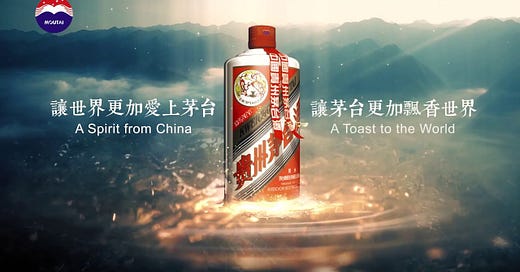Moutai is undoubtedly one of China's most iconic brands, requiring little introduction. In 2022, Kantar recognized Moutai as the third most valuable brand in China, a testament to its enduring popularity and success.
Kweichow Moutai is listed on the Shanghai Stock Exchange and is currently the largest stock by market capitalization in the China A share market. As of the time of writing, its market capitalization is above CNY 2 trillion, making it a pillar in the Chinese stock market.
The brand's image is often associated with diplomats, political leaders, businessmen, and workers toasting with it during official feasts and after-work drinks. While such stereotypes may have some truth to them, what is truly significant is the financial performance of the company.
In the subsequent part of this analysis, we will take a closer look at Moutai's financials, explore its business strategy, and delve into the factors that have led to its success. Furthermore, we will examine whether the company has the potential to continue its growth trajectory in the future.
Liquor is a Lindy business
Liquor has a long and fascinating history, dating as far back as 1200 BC, with the process of distillation being documented on Akkadian tablets. Baijiu, a type of liquor distilled from fermented sorghum, has been around for centuries, with the first baijiu produced during the Tang Dynasty (618-907) and Maotai originating in the Qing Dynasty (1644-1912). Thus baijiu has thousands of years of history and has been passed down through generations.
Baijiu's long and storied history suggests that it will continue to be a relevant drink for many more decades to come, based on the Lindy Effect. This effect posits that the longer something has been around, the more likely it is to continue existing into the future. As such, baijiu's centuries-long history is a strong indicator of its potential longevity
In addition to its long and storied history, Moutai's close association with the Chinese Communist Party (CCP) further cements its position as a national icon. During the Battle of Chishui River, the Red Army used Moutai to boost the morale of their soldiers, and the victory marked a turning point in their triumph over the Kuomintang forces. Since then, Moutai has been a fixture at state banquets and celebrations, and it was even named the national liquor in 1951.
Moutai's status as a symbol of China is also reflected in its use as a welcome drink for foreign heads of state. With such a rich history and cultural significance, it is highly unlikely that Moutai's position could be challenged by other liquor brands. Its close association with the CCP and its enduring popularity among the Chinese people are powerful factors that contribute to its status as a national icon.





